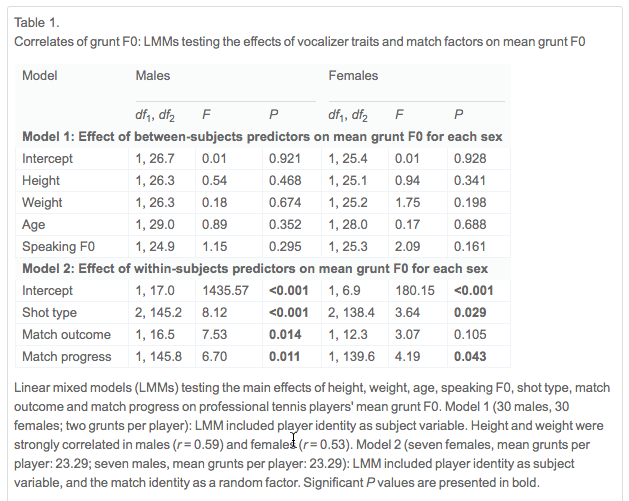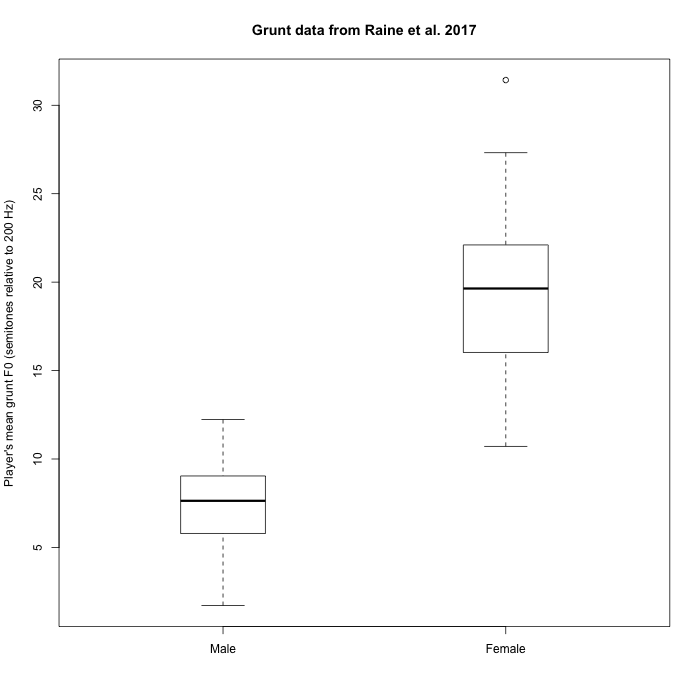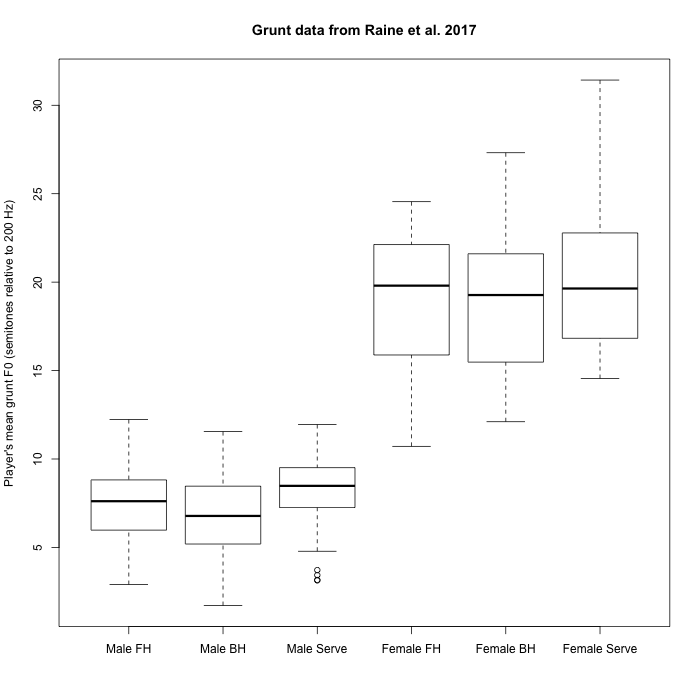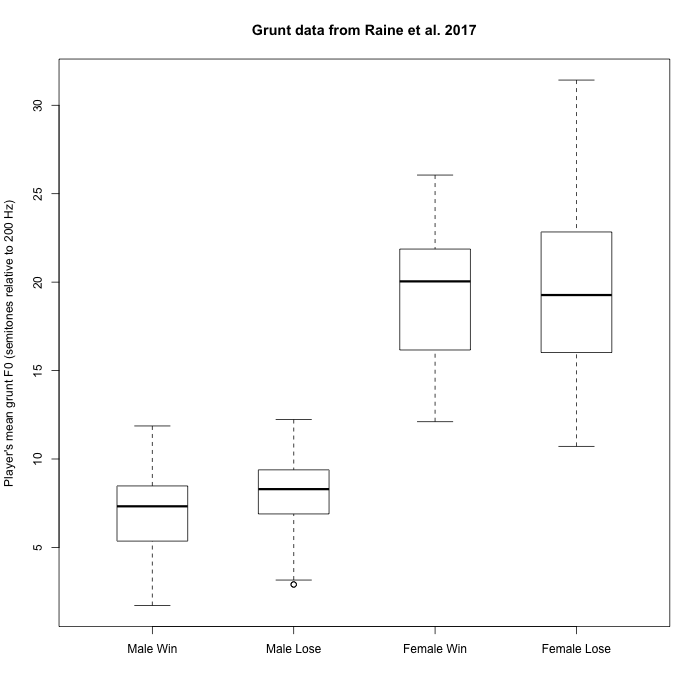Grunt, set, and match
« previous post | next post »
"Who'll win at Wimbledon? Just listen to the pitch of the grunts", University of Sussex press release 7/4/2017:
Never mind counting aces and killer shots. If you want to predict the outcome of a tennis match, pay attention to the players’ grunts.
As Wimbledon prepares for another year of the on-court cacophony from the likes of Rafael Nadal and Victoria Azarenka, a new study has revealed that grunts produced by players during tennis matches they lost were higher in voice pitch than during the matches they won.
What’s more, psychologists at the University of Sussex found that players displayed differences in their grunt pitch long before the scoreboard made it clear whether they would win or lose.
The referenced publication is Jordan Raine, Katarzyna Pisanski, & David Reby, "Tennis grunts communicate acoustic cues to sex and contest outcome", Animal Behavior 2017:
Despite their ubiquity in human behaviour, the communicative functions of nonverbal vocalizations remain poorly understood. Here, we analysed the acoustic structure of tennis grunts, nonverbal vocalizations produced in a competitive context. We predicted that tennis grunts convey information about the vocalizer and context, similar to nonhuman vocal displays. Specifically, we tested whether the fundamental frequency (F0) of tennis grunts conveys static cues to a player's sex, height, weight, and age, and covaries dynamically with tennis shot type (a proxy of body posture) and the progress and outcome of male and female professional tennis contests. […] The F0 of tennis grunts predicted player sex, but not age or body size. Serve grunts had higher F0 than forehand and backhand grunts, grunts produced later in contests had higher F0 than those produced earlier, and grunts produced during contests that players won had a lower F0 than those produced during lost contests. This difference in F0 between losses and wins emerged early in matches, and did not change in magnitude as the match progressed, suggesting a possible role of physiological and/or psychological factors manifesting early or even before matches.
Here's their main table of results:
As is all too common in scientific publications, we learn what the "significant" effects were, in the sense of differences unlikely to be due to sampling error, and the direction of those effects — but not so much about their magnitude.
Luckily the authors post their data in spreadsheet form, so we can look into this.
Unsurprisingly there is a large sex effect:
The shot-type effects are (also unsurprisingly) smaller, but consistent across sex:
As we might have suspected, the overall match-outcome effects are small. And (pooling data across shot type and time in match), they seem to go in different directions for males and females:
I don't have time this evening to work out why their Linear Mixed Model finds that both male and female players have higher mean grunt f0 in losing matches, while a simple boxplot seems to indicate that males tend to grunt higher in losses but females tend to grunt lower. Maybe it has something to do with the model's assumptions about distribution shapes; maybe allowing for shot type and grunt time makes the difference; and maybe I made a mistake (my R code is here if you want to check).
But anyhow, contrary to the implication of the press release, grunt pitch doesn't look like a very powerful predictor of tennis match outcome. And perhaps this outcome should cast some doubt on the relevance of the authors' reference to the "negative relationship between F0 and dominance, and evidence that F0 increases under stress, distress and arousal in both humans … and nonhuman mammals".




ngage92 said,
July 6, 2017 @ 11:54 pm
Like half the players don't grunt at all or very rarely (Eg Federer and Djokovic). Were these just left out of the data set?
tangent said,
July 7, 2017 @ 12:07 am
I appreciate your Look At The Effect Size campaign.
Andreas Johansson said,
July 7, 2017 @ 3:20 am
Despite their ubiquity in human behaviour, the communicative functions of nonverbal vocalizations remain poorly understood.
Is there any reason to believe there is a communicative function here? I mean, I'm pretty sure the players don't intend to communicate things like "I'm female and I'm losing" when they grunt, and it seems dubious that onlookers ordinarily interpret grunts this way – there are more obvious clues to sex, and as for winning/losing, if this were widely understood by people who watch tennis this presumably wouldn't be news.
[(myl) "Grunting in tennis" is enough of a thing to have its own Wikipedia Article, which quotes Martina Navratilova on the side of those who feel that it's done intentionally to distract opponents:
"The grunting has reached an unacceptable level. It is cheating, pure and simple. It is time for something to be done."
But anyhow, intention is not required for communication.]
Rose Eneri said,
July 7, 2017 @ 7:37 am
All the grunting is why I stopped watching tennis. Lots of other sports use ballistic motions without the athletes grunting. Forcefully exhaling, sure, but there is no need to engage the vocal chords. Volleyball players do not grunt when serving or hitting the ball. Also not grunting are baseball pitchers, quarterbacks and boxers.
I agree with the study that grunting can reveal information about the offending players they really would be better off not projecting to their opponents. The information is probably perceived subliminally, but it can provide information about how tired, stressed or distracted the grunter is. Basically, the grunt is a tell. The grunter might try to project deceptive information (I'll hide my fatigue by grunting louder), but a practiced opponent would probably see through it.
D.O. said,
July 7, 2017 @ 8:18 am
The main difference for "grunts predict outcome" is that the study author's use "within player" approach, which is completely swept away by submerging it into "between players" box plots. The box plot for what the author's are doing would be based on the distribution of within-player differences.
That said, this approach means "listen to the grunts and run to the bookie" method of becoming rich depends on precise calibration of each player's average grunt frequency.
[(myl) I'm not convinced. If every player has significantly higher grunt f0 when losing, then the overall distributions should show the same tendency. We could look at the distribution of within-player winning-vs.-losing grunt f0. Unfortunately at that point the per-player N is not very large — but anyhow, my bet is that the comparison won't show a big effect.
Update: You're closer to being right than I thought:
The differences are large only for a couple of players, but 12/14 are above the y=x line…]
Graeme said,
July 8, 2017 @ 5:18 am
Did the authors test for handedness by any chance?
Jens Ørding Hansen said,
July 8, 2017 @ 10:35 am
@D.O.: The "run to the bookie" idea isn't going to work anyway unless the purported grunting effect happens to persist even when relative player rankings and other (pre-match) indications of relative player strength are controlled for. The present study does not appear to have investigated whether this is the case.
Suppose you are watching the world #2 playing against the world #40, and early on in the match you notice that the former is grunting at a lower pitch than he did in his match last week against the world #1 (which he lost). You will infer that he is probably going to win today – but you (and everybody else) knew that already, so your grunting analysis does not give you much of an advantage in the betting markets.
mg said,
July 8, 2017 @ 12:49 pm
I would find the win/loss data more compelling if it compared players to themselves – does a person's grunt frequency change for matches they win versus those they lose?
[(myl) See the plot added in response to an earlier comment.]
And, like you, I'm appalled by articles that only give p-values and not magnitude – mine (not in linguistics) always have magnitude and confidence intervals, which is much more informative.
Ran Ari-Gur said,
July 8, 2017 @ 3:36 pm
I agree with Andreas Johansson. It's true that "communication" doesn't require intention — you can certainly communicate something without meaning to — but "communicative function" seems to imply that the communication is part of the purpose. (And even "communication" at least implies that there's some observer interpreting it.) Do linguists understand "communication" and "communicative function" differently from how everyday English speakers do?
[(myl) Biologists talk about the "communicative function" of pheromones and the "communicative function" of plumage and many other cases where no intention is involved, at least on the part of the proximate source of the signal. For example, from Leonard et al., "Forget-me-not: complex floral displays, inter-signal interactions, and pollinator cognition", Current Zoology 2011:
A typical flower is a multi-sensory billboard, which uses a dazzling variety of stimuli to attract and reward animalvisitors that transfer the plant’s male gametes (pollen) to and from conspecific flowers. Even a casual visual comparison of the flowers produced by animal- vs. wind-pollinated plants underscores how this communicative function has shaped multiple floral traits: wind-pollinated flowers, even those derived from animal-pollinated ancestors, generally produce smaller flowers that are usually unscented, unpatterned, and drab in color.
]
Steven Hartman Keiser said,
July 10, 2017 @ 1:59 pm
Serving well is key to winning in tennis.
When a player is serving well they will win their service games quickly and hence serve less frequently than the losing player.
Fewer serves = lower overall f0.
Rubrick said,
July 11, 2017 @ 1:10 pm
At least the press release isn't titled "To Win At Tennis, Grunt Lower".
I'm led to understand that in martial arts competitions, the equivalent of grunting can quite directly influence the outcome, as competitors can be docked points for poor kiai, the vocalizations emitted when executing a blow.
J.A. B. said,
July 12, 2017 @ 6:45 am
What I get out of all this, very simplified, is that "female tennis players grunt lower when they're losing, whereas male tennis players grunt higher when they're losing", and now I can't help wondering (with my gender goggles on) if this is some kind of unconscious performative defeminization/demasculinization.